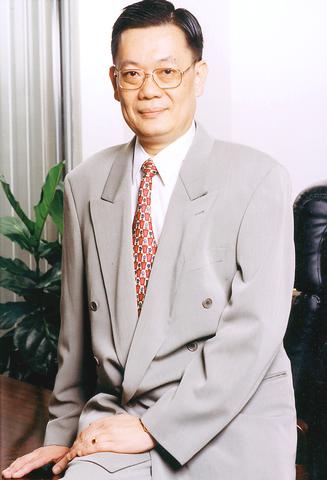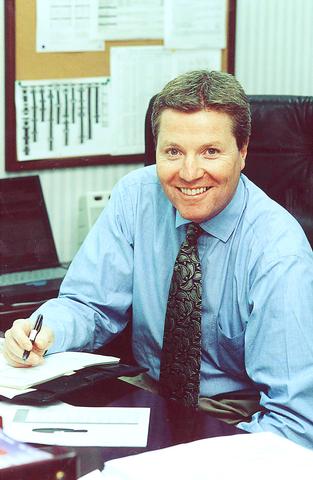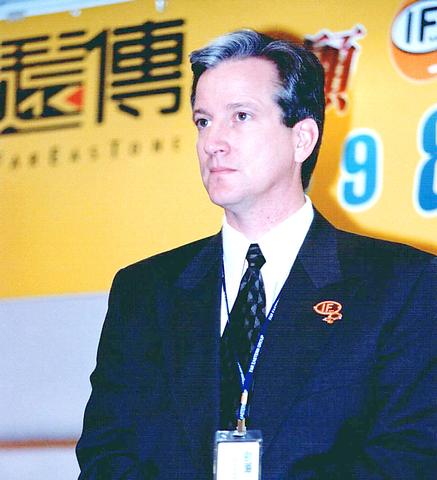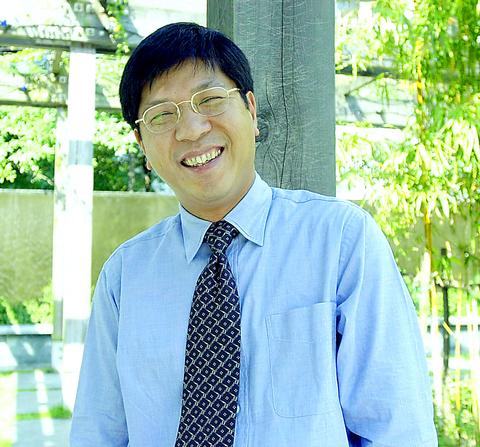Taipei Times: What kinds of cooperation or merger plays do you expect to see in Taiwan's mobile telecom industry in the run up to 3G licensing?
Charlie Midgley: Right now it's kind of like a poker game ... everybody is holding their cards and waiting to see how the game is going to be played out. Everybody is making their own plans. Transasia has probably the most developed team of any of the wireless operators right now. We have dedicated almost 25 of our personnel to the planning of a bid. At the same time we are looking for new shareholders, so much could change on how that turns out. We're doing two things that sound contrary to each other; one is we are looking for new shareholders and that makes it sound like we're for sale but at the same time we're moving full speed ahead regardless of whether we stay with our own shareholders or whether we are under new shareholders -- it makes sense for us to be working full steam ahead to prepare to get that license.
I think that's probably the biggest reason that we've started to look for additional shareholders, so we can be stronger when these national contracts are awarded. We've had discussions with many people but we've not come to a final agreement with any of them ... discussions continue. Either way we think we're very well positioned to get a 3G license because of our performance as a regional 2G operator.

PHOTO: KG TELECOM
Jimmy Yau: We all know TransAsia is looking for new buyer. But because of the current market situation, it's difficult to find one, especially as the mobile players are very concerned with obtaining a 3G license -- which will become their No. 1 priority. So whether they're willing to go for the 3G or are really interested in finding a buyer as soon as possible that's the question. As for the other mobile players and newcomers, they're preparing very hard for 3G license bidding. But with Japan's NTT DoCoMo's major participation in KG Telecom as a 20 percent shareholder, we have every confidence that we can win a 3G license because we know the critical factors for success of how to combine a meaningful and practical business plan in terms of DoCoMo's success on the content services and in terms of 3G preparation since last year. DoCoMo will be the first to launch 3G services in May this year. No other operator will have had the experience of running a so-called wireless, broadband data service.
Joseph O'Konek: Right now the rules are unclear as to how the licenses will be awarded and there's been no final decision on the number of licenses. Once those rules are finalized then all the interested players -- whether they be existing wireless operators in Taiwan, international wireless players looking for an entry into Taiwan, as well as some of the local consortiums -- will begin talking to each other on what's the best way to put together a winning license team. We're exploring all different types of partners and partnership arrangements, looking at our financial models and at what the returns would be. But until you know the rules it's hard to talk about anything.
Steve Wang: Consolidation is currently underway. The consolidation began with the regional companies. First KG and Tuntex combined to form a nationwide operator. More recently it has been announced that the shareholders of TransAsia are attempting to sell their stakes in that company. This trend is occurring not only in Taiwan but worldwide. With regard to cooperation, we have Verizon, the largest wireless operator in the US and one of the five largest operators in the world as our strategic partner. Verizon, in turn, is partnered with Vodafone, the world's largest cellular operator, to introduce 3G services in the US and certain European countries. In a broader sense of cooperation we will be cooperating with content providers, equipment manufacturers, handset suppliers, Internet service providers [ISPs] and [financial institutions] both domestic and international for the delivery of the best 3G services to our customers.

PHOTO: TRANSASIA
TT: How will companies position themselves to prepare for the bidding process and to appear attractive in the event a "beauty contest" is the preferred bidding method?
Midgley: We hope that it goes to a beauty contest. We think that there are ways that the government can increase their long-term gain ... if they chose a beauty contest and the pick the right companies because all the cash up front is not necessarily in the best interests of anyone. If it's a beauty contest then I think we stand out because the Directorate General of Telecommunications (DGT, 電信總局) over the last three years has conducted five in-depth surveys to determine who's done the best job and TransAsia has finished first every single time. So from a beauty contest standpoint we are the most beautiful company already.
If it comes to an auction, that means one thing: money. If it's a beauty contest all that should really matter is can you deliver the products and services the customers will need in a satisfactory way. And the only past performance that the government can look at is what have you accomplished as a 2G operator, that is, if you're not one of the greenfielders. We have proven our worth over three years as a 2G operator. One of the questions in a beauty contest is are we powerful enough economically and politically to compete on a national basis.

TAIPEI TIMES FILE PHOTO
Wang: TCC is best positioned to deliver a high quality 3G network and services to Taiwan consumers. We currently deliver the highest level of customer satisfaction to our customers according to an independent government survey of mobile operators service quality. We also have among the highest network quality and reliability ratings. The critical success factors for a successful 3G service operator are firstly, a large subscriber base; secondly, dense cell site coverage; thirdly, best-in-class in-building coverage; fourthly, strong relationships with content providers and value added service vendors; fifthly, knowledge of customer mobile data usage and usage habits; and lastly, nationwide coverage for 3G and 2G. On each of these items TCC is in a leading position. We have the largest customer base in Taiwan. The TCC network has the greatest number of GSM cell sites providing high quality network coverage and call quality to our subscribers. We currently offer over 1,100 wireless Internet (eWAP) service items from 380 content providers to our customers. In addition, our existing nationwide GSM 1800 network would offer nationwide coverage to our 3G subscribers.
Yau: Most operators have established a 3G team to work on a business proposal and business plan and some of them have employed foreign consultants. When we look at most consultants we examine where they get their information from. Many are trying to draw information from the models in Europe and the UK ... and a lot of them are targeting study on how did NTT DoCoMo do it? What were the successful factors in preparing for their bid? We have a direct channel of communication between KG Telecom and DoCoMo. We share all information and we know what exactly is going on. So our bid to the DGT will be more practical and more towards reality. We have a fairly high chance of winning a 3G license.
O'Konek: What everyone is doing at this point is looking at the business models. If you're an existing operator understanding what it means to your revenue streams beginning in 2002, 2003 and 2004, that's really the hard part for all of us. It's also running the economics as a greenfield operator to understand how aggressive a greenfield player might be if it ends up being an auction. If it comes down to any kind of beauty contest then clearly Far EasTone is well positioned because of our commitment to R&D in terms of what we've done ... none of our competitors have really made those kind of investments. Being innovative and how we position the pricing. Those are things that don't just benefit Far EasTone but generally benefit the development of the Taiwanese wireless market because in every case our competitors end up following. So it raises the bar across the board in terms of what consumers expect, the quality of service and the focus on understanding the customer and not just pushing the products because they are technologically available. That's clearly one of the strengths Far EasTone is continuing to build upon.

PHOTO: CHIANY YING-YING, TAIPEI TIMES
You also have to have a wireless data strategy that takes you beyond 2G and 2.5G and really understanding what's going on there. Really understanding your existing customer base -- your economics -- we're in a market now where 55 percent of the people have cell phones, 26 percent of those have multiple SIM cards. This is why you get 75 percent to 80 percent SIM card penetration. The whole economics of 3G are very different than 2G. So when people were bidding for 2G licenses the market penetration in Taiwan stood at 7 percent. Around the globe, when all the 2G operators came in most of the markets were penetrated for no more than 15 percent to 20 percent. Completely different world ... and it's unpredictable. But it's clearly about migration so those companies that focus on deeper, better customer relationships are going to be the best positioned companies.
TT: There has been controversy worldwide about the high price of 3G licenses. How do you think the government should handle the 3G auction?
Wang: The main issues facing licensing authorities around the world are the appropriate manner and timing for 3G licensing. Licensing authorities are faced with a situation in which the 3G standards have not yet been completely finalized. The 3G network equipment is not yet ready. Although equipment based on proprietary standards from Japan may be launched late this year, this network equipment may not be compatible with world standards. Manufacturers of the world standard WCDMA network equipment, such as Nokia, believe the 3G equipment will not be commercially available until mid-2002 at the earliest. Handsets for the 3G network are also not yet available. Current handset prototypes are approximately the size and weight of a personal computer.
In addition, some countries have auctioned off licenses for extremely high fees. This has resulted in protests from both the winning and losing operators in such countries as the UK, France, the Netherlands and many others. Taiwan is in a position to let domestic 3G manufacturing industry continue to develop and mature while the government and operators assess the international developments and experience.
Yau: The price is a very important issue but it is a variable factor as it depends on how many licenses are released. If they offer five licenses then the cost per operator should be less than NT$10 billion. If they go for three or four licenses then they could go a bit higher. We think they're going to issue about five licenses and the price should be about NT$7 billion to NT$8 billion per operator. If they issue four licenses it could be about NT$20 billion, both of these prices are affordable. If they go for five licenses the total amount for the whole auction should be between NT$70 billion and NT$80 billion.
The government also has to think about 4G. Say you get a return on a new 3G investment in around 10 years, we believe 4G will be coming in around six or seven years time, which will have an impact on 3G. If they price the licenses too high, it not only affects consumers [but] it's not good for the mobile operators either. They should enable the mobile operators to run at the lowest cost but deliver the highest quality operation.
Midgley: If you did a chart of 3G licenses awarded worldwide, it almost parallels the US NASDAQ stock market. The early awards that were given in the middle of 2000 were for exorbitant amounts of money in England and Germany. But when the stock market started to go south all these countries have had trouble raising the amount of capital they thought they would. So very early on everybody was getting excited here because the price of these license was unnaturally high in some countries. But now the reverse has happened and a couple of countries now haven't even gotten enough people to bid. They're pricing people out. It's very difficult to think about a return of investment when you put that kind of a price tag on it. So the government needs to be very sensitive to the economic climate because you want these companies to be successful. It's in the government's best interest that the winners of these licenses are positioned to be successful because then the consumers win. What might be a good idea if the committee that is working on this was to get in contact with the different groups of people who are considering this and sound them out on the concerns that we have and get a better all-round flavor of how this is all going to be economically feasible.
O'Konek: It's impossible to determine what constitutes a reasonable price for a 3G license since the value assigned to the license is really a function of the financial returns and the cash flows that the operator could receive. A reasonable price really varies by market not only in terms of the size of the market, but market readiness, the ability to finance the prices of the license. So at this point, we think it is unrealistic for Taiwan to expect that license prices should go along with what was seen in the UK, Germany or even [South] Korea. There are several reasons for this:
First, while Taiwan is an extremely attractive market in terms of total population and penetration size, it doesn't play the same strategic value for global operators who might be looking for a regional wireless play. So when we go back to the European experience it was the first license in the UK and so if you want to be a regional player you got to get it. So that drove prices up and the market conditions -- in terms of what everybody was valued at -- gave the ability to finance those licenses. You look down the line and governments who were feeling that a rich treasury makes for a rich country may have gotten it backwards. We think the approach of looking at the valuation for this whole license should not be a license valuation but what's the value that Taiwan can create for the national economy. Licensing should be a small part of that. We come to Asia and say licenses are gone in Japan, gone in Korea, we don't know when licensing will be in China. If you ask anyone what's the key to an Asia regional play, it's China. So for anyone who's actually going to put together a regional play for wireless in Asia it hasn't even begun. That alone is going to have an affect on what should the government expect [regarding] valuation.
Taiwan is positioned to be a direct competitor with Japan with [South] Korea and Finland to have a vertically integrated 3G industry. Manufacturing of handsets, manufacturing of switching equipment, base stations, full software development -- if we take that approach and let's say how can Taiwan Inc generate more jobs and become a broader player, that is a view that we think should be explored. The people responsible for policy should look at the big picture. Let's make for a strong, rich country therefore the treasury of the country will also be strong.
TT: What will people use new GPRS [general packet radio service] for? Is it a banking and stock-trading platform? What are the other uses consumers can look forward to?
Midgley: The thing I'm most excited about what GPRS can provide is a location-based service that will identify where you are and -- if you choose to subscribe -- send you information relevant to the specific place you're in. So if you're walking by Sogo Department Store you could find out that on the eighth floor they're having a sale on men's shoes. I think there's a way to take that a step further and have a very significant revenue projection. For example, a little florist or a small restaurant. These guys don't have the money to advertise on the radio or in the newspapers but if you're walking down the street you could get an announcement that at Charlie's flower shop it's 20 percent off today. You could go in there or order them right over the phone. We could then get a cut of that sale. They don't have to pay for the placement of that add and it would be an option you could choose either to subscribe or not subscribe to that service. There's a lot of potential for revenues and synergy. That's a potential real winner for what GPRS is because it's the Internet wherever you are as opposed to the Internet at your desk.
Yau: Business communication, personal correspondence, and entertainment. The high-usage market for voice is the businessman around 40 to 50 years of age, whereas the market for data and content usage are teenagers or young executives. GPRS is targeted at that segment. They like the entertainment and the games offered via GPRS services. That will be a major revenue source.
The wireless application protocol [WAP] services all over the world have not been very successful because they had to go via a modem and, more importantly, it doesn't have the always-on function nor is it packet based. With packet-based services you only pay by volume of content downloaded irrespective of the time spent on the air. But with WAP you pay for every second of air time. Another point is the always-on function. This function means that, for example, while I'm reading some content I get a call, with the always-on function I can take the call and afterwards immediately return to my reading. These services are now available for GPRS, but it is not taking off that rapidly because of the devices. The second generation handsets should be available from vendors like Nokia by end of the second quarter or early in the third quarter this year. Taiwan has the devices, the GPRS infrastructure and the content, so I believe that GPRS will take off as fast as in Japan.
Wang: There is a tremendous variety of services available to a TCC subscriber today. TCC subscribers can buy and sell stocks, check weather, make travel reservations, check their horoscope, play games, etc. As transmission speeds over mobile networks increase and data is delivered in a packet-based always-on format, customers will be able to use existing services and an ever-growing variety of services more economically and at faster speeds. TCC mobile phone customers will have an always-on service to conduct transactions, experience entertainment, find information, or access the Internet with faster speeds and volume-based tariffing.
O'Konek: We're probably going to see two segments generate most of the interest.
The first is going to come from the youth market who as the handset size for GPRS; if it comes down to a reasonable good looking handset we can transport a lot of the gaming and entertainment features off of SMS and off of Fetnet to the GPRS platform. The key is going to be the handsets because the technology will be there -- the speeds will start coming with the four-by-one handsets which will come out later this year. The question is will that handset be attractive to the youth market? If the handset's attractive we think we know enough applications that will begin to drive usage.
The other side is purely business related and we have our enterprise solutions division that we launched this year. We signed 120 contracts with the Fortune 2000 companies in Taiwan, using GPRS for these companies to access their companies' Intranets. The first and easiest thing to do is put a GPRS modem into a laptop so you don't have to reconfigure applications at all. Whether it's sales force automation or individuals wanting to do banking and stock trading we think that [the potential of GPRS] is unlimited.
So you're not going to grow your GPRS by mass market because it's a migration, the products have to be attractive, the applications have to be intrinsically simple to use ... and then it will take on a life of its own.

Taiwan is gearing up to celebrate the New Year at events across the country, headlined by the annual countdown and Taipei 101 fireworks display at midnight. Many of the events are to be livesteamed online. See below for lineups and links: Taipei Taipei’s New Year’s Party 2026 is to begin at 7pm and run until 1am, with the theme “Sailing to the Future.” South Korean girl group KARA is headlining the concert at Taipei City Hall Plaza, with additional performances by Amber An (安心亞), Nick Chou (周湯豪), hip-hop trio Nine One One (玖壹壹), Bii (畢書盡), girl group Genblue (幻藍小熊) and more. The festivities are to

Auckland rang in 2026 with a downtown fireworks display launched from New Zealand’s tallest structure, Sky Tower, making it the first major city to greet the new year at a celebration dampened by rain, while crowds in Taipei braved the elements to watch Taipei 101’s display. South Pacific countries are the first to bid farewell to 2025. Clocks struck midnight in Auckland, with a population of 1.7 million, 18 hours before the famous ball was to drop in New York’s Times Square. The five-minute display involved 3,500 fireworks launched from the 240m Sky Tower. Smaller community events were canceled across New Zealand’s

‘IRRESPONSIBLE’: Beijing’s constant disruption of the ‘status quo’ in the Taiwan Strait has damaged peace, stability and security in the Indo-Pacific region, MOFA said The Presidential Office yesterday condemned China’s launch of another military drill around Taiwan, saying such actions are a “unilateral provocation” that destabilizes regional peace and stability. China should immediately stop the irresponsible and provocative actions, Presidential Office spokeswoman Karen Kuo (郭雅慧) said, after the Chinese People’s Liberation Army (PLA) yesterday announced the start of a new round of joint exercises around Taiwan by the army, navy and air force, which it said were approaching “from different directions.” Code-named “Justice Mission 2025,” the exercises would be conducted in the Taiwan Strait and in areas north, southwest, southeast and east of Taiwan

UNDER WAY: The contract for advanced sensor systems would be fulfilled in Florida, and is expected to be completed by June 2031, the Pentagon said Lockheed Martin has been given a contract involving foreign military sales to Taiwan to meet what Washington calls “an urgent operational need” of Taiwan’s air force, the Pentagon said on Wednesday. The contract has a ceiling value of US$328.5 million, with US$157.3 million in foreign military sales funds obligated at the time of award, the Pentagon said in a statement. “This contract provides for the procurement and delivery of 55 Infrared Search and Track Legion Enhanced Sensor Pods, processors, pod containers and processor containers required to meet the urgent operational need of the Taiwan air force,” it said. The contract’s work would be